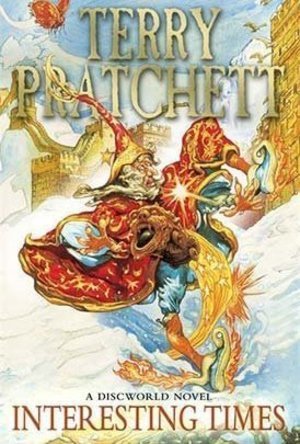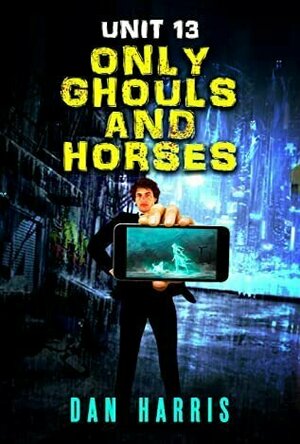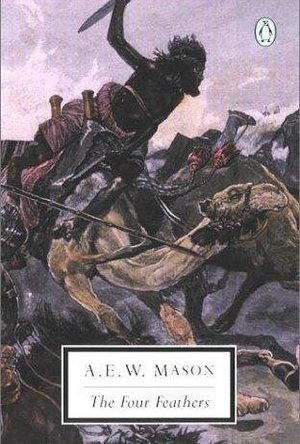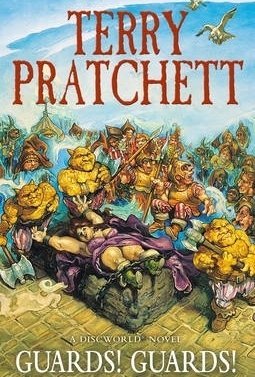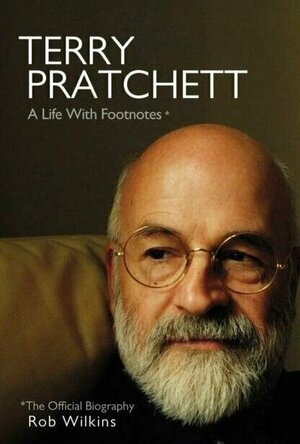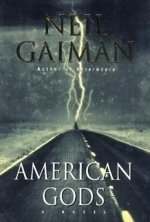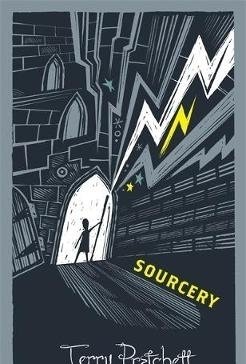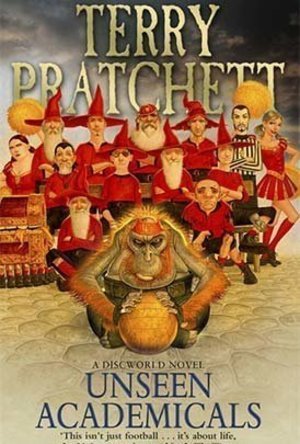Search
David McK (3721 KP) rated Interesting Times (Discworld, #17; Rincewind #5) in Books
Nov 7, 2021
Last seen in (I believe) <i><s>Mort</s>Eric</i>, Terry Pratchett returns to his original Discworld characters of Rincewind and TwoFlower (and Cohen the Barbarian). In this entry, Rincewind is 'rescued' by the Wizards of Unseen University - a University that has changed since he was last there - from his desert island, only to be sent to the Counterweight Continent, where war is brewing ...
For some reason, this is not one of the Discworld books I would return to all that often (never found the Rincewind stories to be amongst the most enjoyable), but still has plenty of laugh out loud moments, alongside some other shrewd observations about life in general.
For some reason, this is not one of the Discworld books I would return to all that often (never found the Rincewind stories to be amongst the most enjoyable), but still has plenty of laugh out loud moments, alongside some other shrewd observations about life in general.
Bethr1986 (305 KP) rated Only Ghouls and Horses in Books
Oct 6, 2022
Independent Reviewer for Archaeolibrarian - I Dig Good Books!
This story tells the tale of poor Tom and how has been recruited by Unit 13, the bureau of a paranormal detective agency. He's been happy with his desk job, but when one of his colleagues goes on maternity leave, he's thrown into the field and he doesn't have a lot of experience.
This book was an absolute howl. It's a paranormal book with a lot of humour thrown in. I really enjoyed the take that Dan has taken on it and delivered. The style very much reminded me of Terry Pratchett. I'm looking forward to reading more.
** same worded review will appear elsewhere **
This story tells the tale of poor Tom and how has been recruited by Unit 13, the bureau of a paranormal detective agency. He's been happy with his desk job, but when one of his colleagues goes on maternity leave, he's thrown into the field and he doesn't have a lot of experience.
This book was an absolute howl. It's a paranormal book with a lot of humour thrown in. I really enjoyed the take that Dan has taken on it and delivered. The style very much reminded me of Terry Pratchett. I'm looking forward to reading more.
** same worded review will appear elsewhere **
David McK (3721 KP) rated The Four Feathers in Books
Jan 28, 2019
'Every man would be a coward where he but brave enough' is a quote that I thought came from this novel.
Turns out I was wrong on both counts - the actual quote is 'For all men would be cowards if they durst', and was actually written by John Wilmot, the Earl of Rochester in his poem "A Satyr against Reason and Mankind" roughly 2 centuries before the publication of this novel.
It's also a line that Mason, ad the others of his generation, would have had absolutely no understanding of and would (probably) have been vehemently against, as depicted in the events of this story.
This story starts on the eve of his regiment sailing off to fight in Sudan, when Harry Feversham resigns his commission, having just gotten engaged to his fiancee. When his 'friends' find out they send him three white feathers - the symbols of cowardice - which he receives in the company of that fiancee, who adds a fourth.
In a bid to retain his honour - valued above all else by the Colonial British of the time - Harry hatches a plan to go under-cover to Sudan, looking for opportunities to prove his bravery to those friends and (finally) his fiancee so they will take their feather back.
(Personally, I don't know why he didn't just do the same as Nobby Nobs in [a:Terry Pratchett|1654|Terry Pratchett|https://d.gr-assets.com/authors/1235562205p2/1654.jpg]'s [b:Jingo|47990|Jingo (Discworld, #21)|Terry Pratchett|https://d.gr-assets.com/books/1327921813s/47990.jpg|1128623], and save said feathers for a mattress ... )
The result is very much a book of its time, very much a 'boys-own' story of Harry and his daring escapades in the Sudan. It's also very much so a novel that needs read with that in mind: to modern minds, the entire premise might seem a little rickety (would someone really go to those extremes just to 'prove' their bravery?), but such was the mores of the day.
Turns out I was wrong on both counts - the actual quote is 'For all men would be cowards if they durst', and was actually written by John Wilmot, the Earl of Rochester in his poem "A Satyr against Reason and Mankind" roughly 2 centuries before the publication of this novel.
It's also a line that Mason, ad the others of his generation, would have had absolutely no understanding of and would (probably) have been vehemently against, as depicted in the events of this story.
This story starts on the eve of his regiment sailing off to fight in Sudan, when Harry Feversham resigns his commission, having just gotten engaged to his fiancee. When his 'friends' find out they send him three white feathers - the symbols of cowardice - which he receives in the company of that fiancee, who adds a fourth.
In a bid to retain his honour - valued above all else by the Colonial British of the time - Harry hatches a plan to go under-cover to Sudan, looking for opportunities to prove his bravery to those friends and (finally) his fiancee so they will take their feather back.
(Personally, I don't know why he didn't just do the same as Nobby Nobs in [a:Terry Pratchett|1654|Terry Pratchett|https://d.gr-assets.com/authors/1235562205p2/1654.jpg]'s [b:Jingo|47990|Jingo (Discworld, #21)|Terry Pratchett|https://d.gr-assets.com/books/1327921813s/47990.jpg|1128623], and save said feathers for a mattress ... )
The result is very much a book of its time, very much a 'boys-own' story of Harry and his daring escapades in the Sudan. It's also very much so a novel that needs read with that in mind: to modern minds, the entire premise might seem a little rickety (would someone really go to those extremes just to 'prove' their bravery?), but such was the mores of the day.
Sarah (7800 KP) rated Guards! Guards! Discworld Novel 8 in Books
Mar 19, 2018
A great introduction to the City Watch
You've got to hand it to Terry Pratchett, he knows how to write a good fantasy novel.
Guards! Guards! is yet another great Discworld novel, and the first to introduce Captain Vimes and the City Watch. Vimes himself is a loveable anti-hero who develops greatly over the course of the novel and the same too can be said for the other members of the Watch. Carrot the 'dwarf' provides a real introduction to the Watch and also a lot of the humour from his exploits, and I loved seeing a lot more of the Librarian.
The plot itself on the face of it is a fantasy fairy tale filled story of dragons, maidens and heroes. But with every Pratchett novel, beneath it lies dark wit and humour, and a slightly sad social commentary on human greed and corruption. There are a lot of references in this to other media, like The Hobbit, which really poke fun at the myths and lore used in the fantasy genre.
A great read with some very engaging characters. A little rambling at times, but fortunately the rest of the book makes up for it! Discworld books are the only books that can really make me laugh out loud.
Guards! Guards! is yet another great Discworld novel, and the first to introduce Captain Vimes and the City Watch. Vimes himself is a loveable anti-hero who develops greatly over the course of the novel and the same too can be said for the other members of the Watch. Carrot the 'dwarf' provides a real introduction to the Watch and also a lot of the humour from his exploits, and I loved seeing a lot more of the Librarian.
The plot itself on the face of it is a fantasy fairy tale filled story of dragons, maidens and heroes. But with every Pratchett novel, beneath it lies dark wit and humour, and a slightly sad social commentary on human greed and corruption. There are a lot of references in this to other media, like The Hobbit, which really poke fun at the myths and lore used in the fantasy genre.
A great read with some very engaging characters. A little rambling at times, but fortunately the rest of the book makes up for it! Discworld books are the only books that can really make me laugh out loud.
David McK (3721 KP) rated Terry Pratchett: A Life with Footnotes in Books
Mar 31, 2023
I don't often read non-fiction - I had enough of that during my school/university days - preferring instead a 'good story'.
I was also going to say that I don't often read biographies.
Except that, truth be told, this is actually the first one that I've ever read (despite attempting, in the past, to start some and then getting bored senseless within about the first 10 pages or so ...)
And also, truth be told, it wasn't one that I was really going out of my way to look forward, except that the late, great Terry Pratchett is/was one of my favourites and that I saw this on sale for something like 99p.
Written by long-term assistant Rob Wilkins, this has been compiled - I think that's the right word - from 'official' notes/memories as provided by Pratchett himself (before his untimely death, in 2015, to a rare form of Alzheimer's) and from personal recollections of Rob himself, covering Pratchett's entire life story from his childhood) where he was told by his headmaster he would never amount to anything and hated reading), right on through to his diagnosis and eventual (unassisted) death.
The last part, in particular, is particularly moving.
I was also going to say that I don't often read biographies.
Except that, truth be told, this is actually the first one that I've ever read (despite attempting, in the past, to start some and then getting bored senseless within about the first 10 pages or so ...)
And also, truth be told, it wasn't one that I was really going out of my way to look forward, except that the late, great Terry Pratchett is/was one of my favourites and that I saw this on sale for something like 99p.
Written by long-term assistant Rob Wilkins, this has been compiled - I think that's the right word - from 'official' notes/memories as provided by Pratchett himself (before his untimely death, in 2015, to a rare form of Alzheimer's) and from personal recollections of Rob himself, covering Pratchett's entire life story from his childhood) where he was told by his headmaster he would never amount to anything and hated reading), right on through to his diagnosis and eventual (unassisted) death.
The last part, in particular, is particularly moving.
David McK (3721 KP) rated American Gods in Books
Jan 28, 2019
I don't get it: what's all the fuss about?
Written by an English-man now living in America, I'm aware that this has won numerous awards and is on the top of many peoples favourite reads, but for me? Not so much.
I found it tedious, dull, and un-involving, with the idea of new and old Gods fighting it out itself done better (and more enjoyably) elsewhere.
I'm sorry, but I wouldn't recommend this to anyone who asked for a Neil Gaiman book, pointing them instead towards the far superior (IMO) [b:Stardust|16793|Stardust|Neil Gaiman|https://d.gr-assets.com/books/1328433738s/16793.jpg|3166179] or (even better!) [b:Good Omens|12067|Good Omens The Nice and Accurate Prophecies of Agnes Nutter, Witch|Terry Pratchett|https://d.gr-assets.com/books/1392528568s/12067.jpg|4110990].
Written by an English-man now living in America, I'm aware that this has won numerous awards and is on the top of many peoples favourite reads, but for me? Not so much.
I found it tedious, dull, and un-involving, with the idea of new and old Gods fighting it out itself done better (and more enjoyably) elsewhere.
I'm sorry, but I wouldn't recommend this to anyone who asked for a Neil Gaiman book, pointing them instead towards the far superior (IMO) [b:Stardust|16793|Stardust|Neil Gaiman|https://d.gr-assets.com/books/1328433738s/16793.jpg|3166179] or (even better!) [b:Good Omens|12067|Good Omens The Nice and Accurate Prophecies of Agnes Nutter, Witch|Terry Pratchett|https://d.gr-assets.com/books/1392528568s/12067.jpg|4110990].

The Mysterious World of Cats: The Ultimate Gift Book for People Who are Bonkers About Their Cat
Book
'In ancient times cats were worshipped a gods; they have not forgotten this.' Terry Pratchett Herbie...
David McK (3721 KP) rated Sourcery: Discworld: The Unseen University Collection in Books
Nov 27, 2022
One of the earliest Discworld (#5) books by the late, great, Sir Terry Pratchett, and it shows.
At this point the series was still very much in its infancy; very much still a parody of classic 'Sword and Sorcery' (especially where Rincewind is concerned) instead of the exploration of the human character it would later become.
Everybody has their own favourite 'subseries' of Discworld novels - The Witches, Stand-alones, Industrial Revolution, City Guards, Death - for me, personally, the Rincewind series has also fallen towards the bottom of that ranking (although they do get better around about the time of Interesting Times).
Having said that, it's still interesting to see the beginnings of Pratchett's evolution of the Discworld here - like any great symphony, they all need to start somewhere!
At this point the series was still very much in its infancy; very much still a parody of classic 'Sword and Sorcery' (especially where Rincewind is concerned) instead of the exploration of the human character it would later become.
Everybody has their own favourite 'subseries' of Discworld novels - The Witches, Stand-alones, Industrial Revolution, City Guards, Death - for me, personally, the Rincewind series has also fallen towards the bottom of that ranking (although they do get better around about the time of Interesting Times).
Having said that, it's still interesting to see the beginnings of Pratchett's evolution of the Discworld here - like any great symphony, they all need to start somewhere!
Mothergamer (1619 KP) rated Unseen Academicals (Discworld, #37; Rincewind #8) in Books
Apr 3, 2019
I recently finished reading Unseen Academicals by Terry Pratchett, the latest book in the Discworld series. The wizards at Unseen University discover a law that states that they must participate in city football games (soccer), but the catch is they can't use any magic. The assistant candle dribbler, Mr. Nutt is brought in to coach this humorous seemingly hopeless team of over the hill wizards. Mr. Nutt is a little odd and seems to be a goblin, but he can't really remember himself. He befriends his candle dribbler boss Trevor Likely whose father was a famous footballer and they strike up an unlikely, but endearing friendship.
I loved this book. The friendship between Mr. Nutt and Trevor makes you smile and even laugh at certain points in the story. Terry Pratchett introduces some new characters like Juliette, Trevor's love interest and assistant cook and Glenda, her supervisor who warns her all the time about men and their ways. There are even cameo appearances by old favorites like Rincewind, the librarian, DEATH, the watch, and even Lord Vetinari.
The pacing starts off a little slow, but it finds its groove and we are told a great story about football, the fans, and the players. We are also shown how wonderful it is when you have friends and loved ones, that see the good in you and because they believe in you, it brings out the best in you. There are also the funny jokes, wit, and social commentary that comes with a Discworld book, overall making it quite an enjoyable read.
If you haven't read Unseen Academicals yet and you are a Discworld fan, I suggest you do. It's a great story and you will find yourself chuckling at various moments.
I loved this book. The friendship between Mr. Nutt and Trevor makes you smile and even laugh at certain points in the story. Terry Pratchett introduces some new characters like Juliette, Trevor's love interest and assistant cook and Glenda, her supervisor who warns her all the time about men and their ways. There are even cameo appearances by old favorites like Rincewind, the librarian, DEATH, the watch, and even Lord Vetinari.
The pacing starts off a little slow, but it finds its groove and we are told a great story about football, the fans, and the players. We are also shown how wonderful it is when you have friends and loved ones, that see the good in you and because they believe in you, it brings out the best in you. There are also the funny jokes, wit, and social commentary that comes with a Discworld book, overall making it quite an enjoyable read.
If you haven't read Unseen Academicals yet and you are a Discworld fan, I suggest you do. It's a great story and you will find yourself chuckling at various moments.
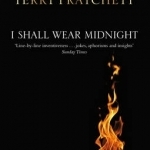
I Shall Wear Midnight: (Discworld Novel 38)
Terry Pratchett and Paul Kidby
Book
A man with no eyes. No eyes at all. Two tunnels in his head ...It's not easy being a witch, and it's...
